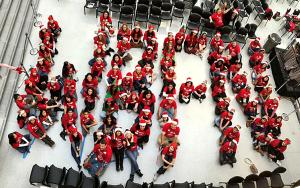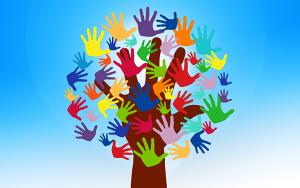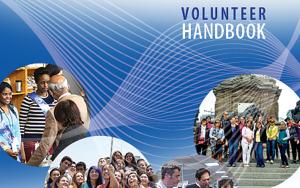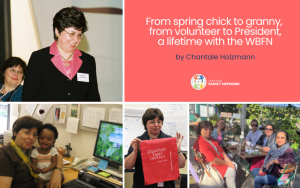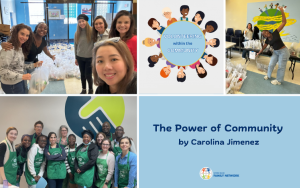
How do we connect with people in a new country? What are some of the ways that we can make friends and start to build a community?
Aline arrived in Washington DC from Brazil. Her husband’s assignment was for one year, so she came with a carefree attitude. It was an adventure, she would improve her English, and then she would return to her family and friends, and her job as a physical therapist. Compared to most relocations to DC, it was very simple. She didn’t apply for a work permit or even get a driving license. They bought some furniture from Ikea.
On her third day in Washington, Aline went into the WBFN office. She was curious to see what opportunities there might be for her. The very first person she met was Carla, a fellow Brazilian of her age, who happened to be in the office working as a volunteer that morning. “It was so important that the first person I met I could really communicate with,” Aline said, remembering the moment with a smile. Carla would become one of Aline’s best friends, and a mentor—someone who would guide her when she had questions and concerns.
Aline started to go to the WBFN almost every day to use the computer and to be around people. “That space became my second home.” She wasn’t setting out to make connections, but instinctively she felt this was what she needed. She met the coordinator, who was fluent in Portuguese, and who encouraged her to become active in the organization. Volunteering provided another way to make contacts, and Aline eventually became involved in three different volunteer activities.
Another surprise at the WBFN was that her beginner English, which she had felt very self-conscious about, didn’t seem to stand out. There were so many different skill levels and accents among the members, and the office became the one place in the city Aline did not feel embarrassed to make a mistake. She enrolled in a WBFN English class. On the first day of the course, she showed the teacher how to make a class WhatsApp group. Much to the teacher’s surprise, the informal and easy way she and the students all communicated outside class on WhatsApp had many benefits, which increased over the duration of the course. The students sent encouraging messages to each other, expressed sympathy over challenges they were having, gave each other tips, and could ask the teacher emergency questions about English usage. The WhatsApp group ended up bringing the students, almost all of whom had recently arrived in the country, together as a community.
After one year, Aline’s husband was offered a permanent position. Suddenly, for the first time, she began to be afraid. She was cut off from her family, her friends, her job, and her culture in Brazil but now there was no end point. She also had a very specific fear: the health care system. Aline was recovering from a serious illness when she relocated, and she needed to be followed by doctors in Washington. The protocol her doctor in Brazil had followed was designed by a Washington DC physician, which seemed incredibly fortunate, but when Aline saw a colleague of that doctor, she found to her dismay that they weren’t following their own protocol. They ordered far more difficult and invasive tests, which left her confused and very anxious.
Carla, her friend and mentor, suggested seeing a mental health counselor at the WBG. During the visits, which were free of charge, Aline and the psychologist talked about her concerns, and together they developed a strategy for Aline to feel more at ease with the situation.
A second challenge came a few months later when Aline discovered she was pregnant. She struggled to find an OB/GYN she liked. They seemed so cold and detached compared to the style of doctors in Brazil. Eventually, she got a good recommendation from a colleague of her husband. (The staff member can also have an important role in building a community.)
One day in her apartment, Aline was pretty sure her labor had begun. Excited, she sent a text to a few friends. One of them, Georgine, texted back that she would give Aline a lift to the doctor’s office. There Aline was told to go to the hospital, where Georgine also drove her. This was hugely helpful, because she had heard that a taxi or Uber might refuse to take a heavily pregnant woman to the hospital. Her healthy baby, Bia was born a few hours later.
Back at home with the baby, things were difficult. Little Bia was not putting on weight. She sucked so slowly that Aline was spending almost every hour Bia was awake breastfeeding her. Hungry babies do not sleep well, so Aline’s day and night merged into one long, increasingly difficult task. Even after a small procedure to release some tight tissue under Bia’s tongue, the situation did not improve significantly. Aline wasn’t sleeping, her baby wasn’t growing, and now the pediatrician was concerned. Aline found comfort in calling her friends and family in Brazil while she endlessly sat trying to get Bia to nurse.
One day, Georgine called to ask how things were going, and Aline broke down on the phone. Georgine came by immediately, cooked her a dinner, and miraculously managed to get Bia to take a bottle for the first time. Being cared for, and being with another woman who had already had children made all the difference to Aline.
“Why didn’t you tell me you needed help?” asked Carla later. Aline had felt too embarrassed. Her husband was home on paternity leave, so she wasn’t alone. How could she admit to others she was failing at this elementary task?
After Georgine’s visit, Bia started to take a bottle, and began to nurse better, which allowed Aline to relax. She could focus on her friendship with a neighbor, whose baby was only two months older. Another woman in the building came by with meals and offers of help. Aline was surprised that this happened, because she had come to Washington thinking the culture would be less warm than in Brazil, but she discovered that people like to make connections just as much in the US.
Aline also started a WhatsApp group for new mothers at the WBFN. They exchange tips and information, such as the best kind of stroller, or if anyone can recommend a nanny. She and her husband have bought a car, and now she is beginning the (lengthy) process of getting a driving license.
Aline didn’t set out to build a community. She is not especially extroverted, and was not one of the popular girls at school when she was young. She walked through the doors of WBFN and kept coming back in part because she wanted to be around people, which was a personal need, and in part because she had practical needs—the many questions about relocation she needed help with, and even the use of the printer. She met her best friend there, and coming in regularly, she started to meet others. She became involved in many different volunteering activities, took an English course, and met more people. She created two different WhatsApp communities.
Looking back, it was a combination of needs, curiosity and initiative that made a community for Aline.
Restrict content to registered Users?:
0

